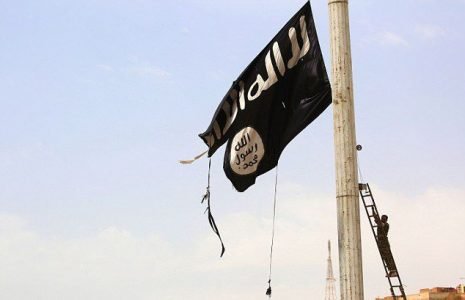
Islamic State flag raised at Syrian camp holding jihadi families
The black flag of Isis has been hoisted in a Syrian camp holding tens of thousands of the terror group’s family members, nearly four months after the caliphate was officially declared defeated.
In a video posted online, women and children can be seen cheering while the homemade flag flutters from a pole. The crowd are heard shouting “baqiya” – the Arabic word for “remaining” – a reference to the Isis slogan “remaining and expanding”.
The video first appeared on Monday, according to Jihadoscope, a monitoring group focused on the spread of terror propaganda across the web and social media, but it is not the first such incident at the sprawling al-Hol camp in northeast Syria. It comes amid warnings of growing radicalisation at the facility.
Earlier this month, a video purportedly filmed at the camp showed women re-pledging their allegiance to Isis leader Abu Bakr al-Baghdadi, and calling on him to “liberate” them. Several guards have been attacked by residents.
Despite rising tensions at camps like al-Hol, the international community is still at odds over what to do with the inhabitants, including more than a dozen British women and their children, including Shamima Begum.
Tens of thousands of women and children fled the last sliver of the self-proclaimed caliphate, in the eastern Syrian village of Baghouz, before its complete recapture earlier this year.
Many of them were local residents who became trapped within Isis areas by the battle, but the majority were the wives and family members of fighters who showed little sign of abandoning the group.
Most are now being held in detention camps controlled by the Syrian Democratic Forces (SDF). Al-Hol, the largest of those camps, has a population of more than 70,000 people – mostly women and children from Syria and Iraq – together with around 9,000 foreign citizens.
Last week, the deputy commander of the US-led coalition to defeat Isis told The Independent that the potential for radicalisation in the camps was “the biggest long-term strategic risk” in ensuring its total defeat.
“Outside the military dimension, the biggest long-term strategic risk that I see is a continuation of that ideology and its ability to fester in some of those environments,” said Major General Alexus Grynkewich.
Nearly half of al-Hol’s inhabitants are children under the age of 12. The eldest among them will have been subjected to years of indoctrination under Isis. But the video of the flag being raised appears to show younger children chanting Isis slogans, which may suggest that indoctrination is being led by women in the camp, according to one expert.
“Due to the timescale of Isis’s territorial collapse, it is unlikely that very young children would have undergone formal indoctrination in the group’s schools or military training camps for boys,” Gina Vale, research fellow at the International Centre for the Study of Radicalisation, based at King’s College London, told The Independent.
“Therefore the role of the family unit, particularly the mother, has been critical to raise children, from infancy, in the worldview proscribed by Isis’s ideology,” she added.
Foreign governments have shown little willingness to take back their citizens from the camps over fears they will pose a significant security risk. There are thought to be at least 19 British women currently at al-Hol, and camps Roj and Ain Issa, together with at least 30 of their children.
The plight of British children stuck in Syria made the headlines earlier this year when the infant child of Shamima Begum, named Jarrah, died in the al-Hol camp. The British teenager fled her home in Bethnal Green, London, to join Isis in Syria in 2015.
Sajid Javid, the home secretary, has previously said that he would move to block any British citizen suspected of joining Isis from returning. However, Jeremy Hunt, the foreign secretary, recently suggested that their children might be taken back.
Source: Independent





